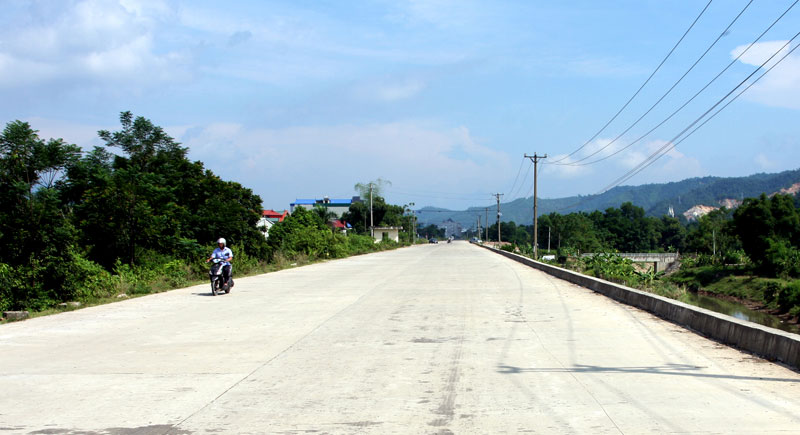
(HBO) - Hoa Binh City is the first district-level locality of Hoa Binh province to have satisfied standards for new-style rural areas, with all the seven communes having received recognition for meeting all the criteria of the programme in the period of 2016-2020, including one particularly disadvantaged commune in the Hoa Binh reservoir area.
Over the past eight
years, the city has made prominent and comprehensive achievements in its programme
of building new-style rural areas, helping improve
the spiritual and material life of locals.
The traffic and irrigation systems in communes have been built and
upgraded, facilitating locals’ travel and production activities.
Local residents are
provided with safe electricity. All the communes in the city have facilities
serving cultural and sport activities. Up to 91.96 percent of households in the
city have houses meeting prescribed standards; and 98.5 percent of rural
residents have access to hygienic water.
The living conditions of locals have been improved. The per capita income in
rural areas in the city reaches 39 million VND/year; the rate of poor household
is at 1.05 percent; and 90.3 percent of the locality’s population has bought health
insurance.
 Traffic system in Su Ngoi (Hoa Binh City) has
met locals’ demand of travel and goods transport.
Traffic system in Su Ngoi (Hoa Binh City) has
met locals’ demand of travel and goods transport.
Authorities of Hoa
Binh city has mobilised over 862 billion VND for its new-style rural area building programme, including more than 94 billion
VND contributed by locals.
Rural
infrastructure in the locality has been invested and upgraded in a concerted
and modern manner, effectively serving production and daily activities of local
residents.
Agricultural production has been improved in the direction of strengthening linkage
of commodity production in combination with promoting development of industry,
tourism and services, along with creating close links between rural development
and urban development in line with the master plan.
As a result, local people's material and spiritual life has been better. The
quality of education, health, culture, and environment has been improved, and
the national cultural identity preserved and developed.
The locality has also paid attention to maintaining political security and
social order. The political organization
system of the locality is increasingly strong, and the implementation ofgrassroots democracypromoted.
Hoa Binh province is undergoing a dynamic transformation amid Vietnam’s national digital transition. Building on Poliburo’s Resolution No. 57-NQ/TW on breakthroughs in science, technology, innovation, and national digital transformation, the province has rolled out a wide range of practical action plans. A standout initiative is the "Digital Literacy for All” movement, an effort to ensure that no one is left behind in the digital era.
Hoa Binh province is undergoing a dynamic transformation in the wake of the national digital transformation movement. Building on Resolution No. 57-NQ/TW of the Politburo on breakthroughs in science, technology, innovation, and national digital transformation, the province has implemented a wide range of practical action plans. A standout initiative is the "Digital Literacy for All” movement ambitious effort to ensure that no one is left behind in the digital age.
With a spirit of unity and proactive problem-solving, the Party Committee, the government and the people of Dong Lai Commune (Tan Lac District) have made great strides in implementing the resolutions of the 24th Party Congress of the commune for the 2020 - 2025 term. Focusing on leadership and practical actions, the commune has brought the Party’s resolutions into daily life, creating strong impacts and pushing the local development forward.
Amid the nationwide push for digital transformation, young people in Hoa Binh Province are stepping up as dynamic pioneers, applying technology to enhance Youth Union operations and expand the reach of youth-led initiatives. Through creativity and adaptability, Youth Union organizations at all levels have introduced a series of practical solutions, contributing to modern governance and community development.
In recent years, An Nghia commune, located in Lac Son district, has stepped up administrative reform, focusing on improving the quality and efficiency of its single-window service unit for receiving and processing administrative procedures. These improvements have helped create favourable conditions for local residents and organisations to handle administrative procedures, contributing to the commune’s broader socio-economic development.
The Prime Minister-approved master plan to develop the multi-use value of forests ecosystems through 2030, with a vision to 2050, aims to improve the management and sustainable use of forest resources, create jobs, increase incomes, and improve the living standards of ethnic minorities, people in mountainous and remote areas, forest workers and those living near forests.



 Traffic system in Su Ngoi (Hoa Binh City) has
met locals’ demand of travel and goods transport.
Traffic system in Su Ngoi (Hoa Binh City) has
met locals’ demand of travel and goods transport.